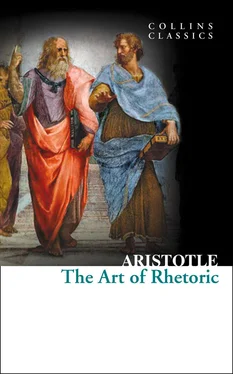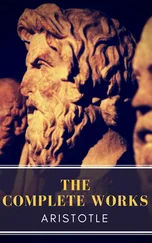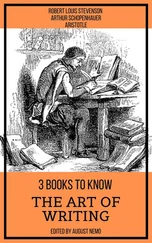Political speaking urges us either to do or not to do something: one of these two courses is always taken by private counsellors, as well as by men who address public assemblies. Forensic speaking either attacks or defends somebody: one or other of these two things must always be done by the parties in a case. The ceremonial oratory of display either praises or censures somebody. These three kinds of rhetoric refer to three different kinds of time. The political orator is concerned with the future: it is about things to be done hereafter that he advises, for or against. The party in a case at law is concerned with the past; one man accuses the other, and the other defends himself, with reference to things already done. The ceremonial orator is, properly speaking, concerned with the present, since all men praise or blame in view of the state of things existing at the time, though they often find it useful also to recall the past and to make guesses at the future.
Rhetoric has three distinct ends in view, one for each of its three kinds. The political orator aims at establishing the expediency or the harmfulness of a proposed course of action; if he urges its acceptance, he does so on the ground that it will do good; if he urges its rejection, he does so on the ground that it will do harm; and all other points, such as whether the proposal is just or unjust, honourable or dishonourable, he brings in as subsidiary and relative to this main consideration. Parties in a law-case aim at establishing the justice or injustice of some action, and they too bring in all other points as subsidiary and relative to this one. Those who praise or attack a man aim at proving him worthy of honour or the reverse, and they too treat all other considerations with reference to this one.
That the three kinds of rhetoric do aim respectively at the three ends we have mentioned is shown by the fact that speakers will sometimes not try to establish anything else. Thus, the litigant will sometimes not deny that a thing has happened or that he has done harm. But that he is guilty of injustice he will never admit; otherwise there would be no need of a trial. So too, political orators often make any concession short of admitting that they are recommending their hearers to take an inexpedient course or not to take an expedient one. The question whether it is not unjust for a city to enslave its innocent neighbours often does not trouble them at all. In like manner those who praise or censure a man do not consider whether his acts have been expedient or not, but often make it a ground of actual praise that he has neglected his own interest to do what was honourable. Thus, they praise Achilles because he championed his fallen friend Patroclus, though he knew that this meant death, and that otherwise he need not die: yet while to die thus was the nobler thing for him to do, the expedient thing was to live on.
It is evident from what has been said that it is these three subjects, more than any others, about which the orator must be able to have propositions at his command. Now the propositions of Rhetoric are Complete Proofs, Probabilities, and Signs. Every kind of syllogism is composed of propositions, and the enthymeme is a particular kind of syllogism composed of the aforesaid propositions.
Since only possible actions, and not impossible ones, can ever have been done in the past or the present, and since things which have not occurred, or will not occur, also cannot have been done or be going to be done, it is necessary for the political, the forensic, and the ceremonial speaker alike to be able to have at their command propositions about the possible and the impossible, and about whether a thing has or has not occurred, will or will not occur. Further, all men, in giving praise or blame, in urging us to accept or reject proposals for action, in accusing others or defending themselves, attempt not only to prove the points mentioned but also to show that the good or the harm, the honour or disgrace, the justice or injustice, is great or small, either absolutely or relatively; and therefore it is plain that we must also have at our command propositions about greatness or smallness and the greater or the lesser-propositions both universal and particular. Thus, we must be able to say which is the greater or lesser good, the greater or lesser act of justice or injustice; and so on.
Such, then, are the subjects regarding which we are inevitably bound to master the propositions relevant to them. We must now discuss each particular class of these subjects in turn, namely those dealt with in political, in ceremonial, and lastly in legal, oratory.
4
First, then, we must ascertain what are the kinds of things, good or bad, about which the political orator offers counsel. For he does not deal with all things, but only with such as may or may not take place. Concerning things which exist or will exist inevitably, or which cannot possibly exist or take place, no counsel can be given. Nor, again, can counsel be given about the whole class of things which may or may not take place; for this class includes some good things that occur naturally, and some that occur by accident; and about these it is useless to offer counsel. Clearly counsel can only be given on matters about which people deliberate; matters, namely, that ultimately depend on ourselves, and which we have it in our power to set going. For we turn a thing over in our mind until we have reached the point of seeing whether we can do it or not.
Now to enumerate and classify accurately the usual subjects of public business, and further to frame, as far as possible, true definitions of them is a task which we must not attempt on the present occasion. For it does not belong to the art of rhetoric, but to a more instructive art and a more real branch of knowledge; and as it is, rhetoric has been given a far wider subject-matter than strictly belongs to it. The truth is, as indeed we have said already, that rhetoric is a combination of the science of logic and of the ethical branch of politics; and it is partly like dialectic, partly like sophistical reasoning. But the more we try to make either dialectic rhetoric not, what they really are, practical faculties, but sciences, the more we shall inadvertently be destroying their true nature; for we shall be re-fashioning them and shall be passing into the region of sciences dealing with definite subjects rather than simply with words and forms of reasoning. Even here, however, we will mention those points which it is of practical importance to distinguish, their fuller treatment falling naturally to political science.
The main matters on which all men deliberate and on which political speakers make speeches are some five in number: ways and means, war and peace, national defence, imports and exports, and legislation.
As to Ways and Means, then, the intending speaker will need to know the number and extent of the country’s sources of revenue, so that, if any is being overlooked, it may be added, and, if any is defective, it may be increased. Further, he should know all the expenditure of the country, in order that, if any part of it is superfluous, it may be abolished, or, if any is too large, it may be reduced. For men become richer not only by increasing their existing wealth but also by reducing their expenditure. A comprehensive view of these questions cannot be gained solely from experience in home affairs; in order to advise on such matters a man must be keenly interested in the methods worked out in other lands.
As to Peace and War, he must know the extent of the military strength of his country, both actual and potential, and also the mature of that actual and potential strength; and further, what wars his country has waged, and how it has waged them. He must know these facts not only about his own country, but also about neighbouring countries; and also about countries with which war is likely, in order that peace may be maintained with those stronger than his own, and that his own may have power to make war or not against those that are weaker. He should know, too, whether the military power of another country is like or unlike that of his own; for this is a matter that may affect their relative strength. With the same end in view he must, besides, have studied the wars of other countries as well as those of his own, and the way they ended; similar causes are likely to have similar results.
Читать дальше












